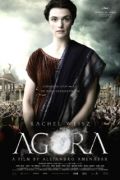
Directed by
Alejandro Amenabar
127 minutes
Rated M
Reviewed by
Sharon Hurst

Agora
Synopsis: Egypt in the 4th century AD is under Roman rule. The famous library of Alexandria is curated by Theon (Michael Lonsdale) while his daughter, Hypatia (Rachael Weisz), is an esteemed teacher and philosopher with a group of worshipping students. Among them is Orestes (Oscar Isaac), desperately in love with Hypatia, and also her slave Davus (Max Minghella), equally besotted. But love for a man does not enter into Hypatia’s world of learning. While some of the Romans still worship pagan Gods, Christianity is on the rise. Davus is torn between his old way of life and the freedom that could be his if he joins the Christians. But, as the warring factions clash, even more critical is what will happen to Alexandria and its magnificent repository of the world’s knowledge.While watching Agora I had a sense of the epic scope of the story, but I also found myself a little confused at times as to which group was which, especially when the Romans, Christians and Jews all fell to fighting. However, reflecting upon the story, and researching a little into the actual history I am really amazed at several things – that this story has not been told before, that there was a woman who was so revered for her wisdom in an era when men ruled absolutely, and that so much of the intolerance of then still continues today (well, maybe that’s not so amazing) There is really a truckload of themes and ideas in this film, all presented in a way that makes for fascinating viewing.
Amenabar describes his film as “the story of a woman, of a city, of a civilisation and of a planet”, and this certainly is an ambitious sweep to encompass. Just to get the look of the ancient world in a way that doesn’t rely on the ubiquitous CGI modelling is a major technical feat, one he has achieved splendidly by filming in Malta, at Fort Ricasoli. He has reconstructed Hypatia’s incredible astronomical models so we understand her scientific thinking and with his wide-reaching multi-national cast he has brought a compelling sense of the multi-cultural nature of the great city.
The cinematography makes stunning use of overhead shots, at times pulling back to give us a view of the entire planet, pinpointing humans and history as mere blips within the wider cosmos and underscoring the types of challenging and controversial ideas with which Hypatia was constantly engaged.
Hypatia has been thoughtfully cast with Weisz utterly convincing as this rare woman who was not prepared to subjugate herself to a man and who was willing to die for her ideas. The male cast are similarly well chosen for their parts, from the major roles already mentioned through to characters like Cyril (Sami Samir), a fundamentalist Christian leader. And talking of fundamentalism, this film can only reinforce anyone’s beliefs that religion does the world little good as these various factions use religion to their own political ends and brutalise their fellow humans in the name of a loving God (sound familiar in today’s world?)
Although its musical score at times seems relentless, with its big ideas, dramatic and powerful action sequences, and superb visuals Agora proves that film can bring dusty history to life in a truly fascinating way.

Want more about this film?


Want something different?




